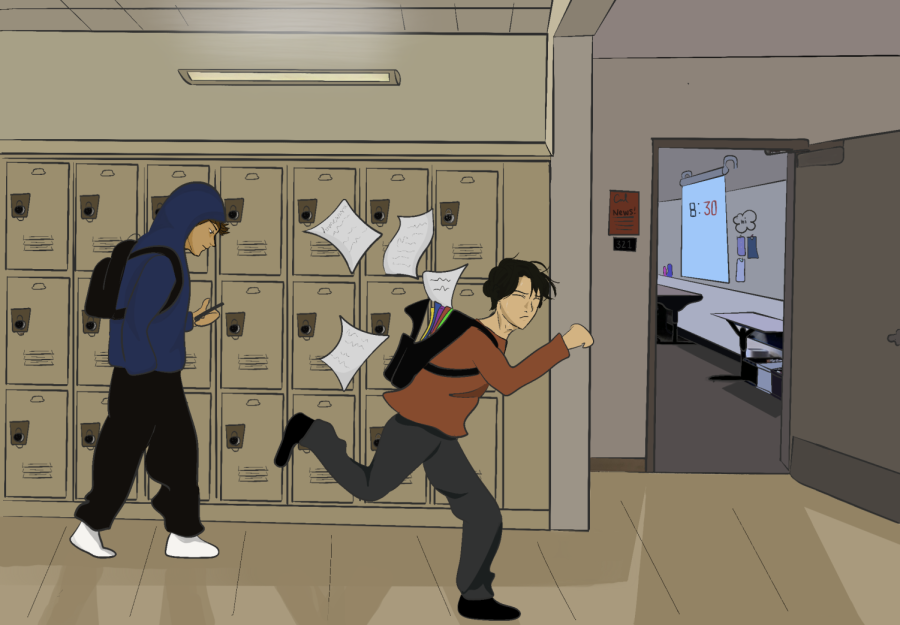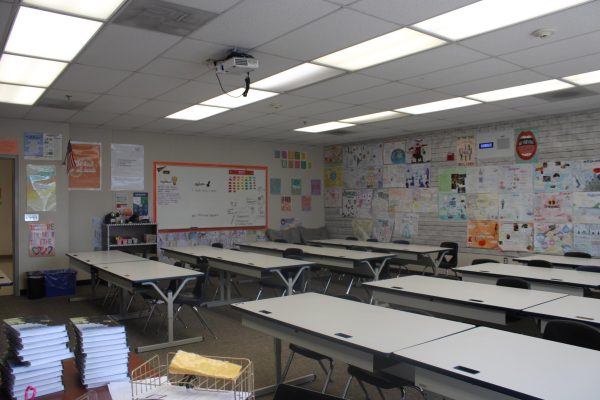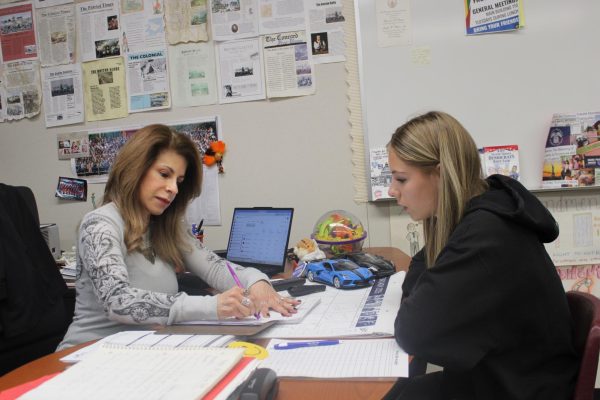Teachers take different approaches to tardies
Students’ late arrival to class result in a wide range of consequences
A student dashes to class moments before the bell rings as another trudges through the hall, apathetic to being tardy.
Whether students are waiting in the Starbucks drive thru, sleeping through their alarms, or pestering their parents to drive them to school on time, tardiness is an issue for many Cal High students.
Consistent tardiness not only ends up on a student’s record, but some teachers believe it can also build bad habits that will affect their future careers. When students join the workforce, not having the fundamental skill of punctuality could cost them their job, global studies teacher Benjamin Andersen said.
“It shows some level of dedication, you don’t want to show up late to a job interview because that shows that you don’t really care,” Andersen said. “It [being on time] builds a level of professionalism.”
Regardless of the impression being tardy gives teachers, many students, especially seniors, continue to be chronically late. A combination of teachers with lenient policies, lax repercussions, and senioritis often makes it hard for upperclassmen to take their attendance seriously.
“I think that as you progress throughout high school, you realize that being on time is not the most important thing,” junior Tanya Bailey said. “And you just don’t take it as seriously.”
Many students feel upperclassmen lose motivation to attend school and arrive on time for classes as the year goes on.
“Seniors especially [are more prone to tardies] because I think senioritis kicks in second semester,” senior Harshitha Palacharla said. “Younger grade levels tend to be more on time and more present than seniors, especially in second semester.”
Cal administrators have implemented consequences in order to solve the tardy issues. The school’s student handbook states that students should receive a lunch detention every three tardies, and a Monday school every nine tardies.
Administrative teacher on special assignment Michelle Mascote, who helps oversee Monday school, believes these guidelines will help pave the way for academic success when it comes to building a routine.
“I think it’s an important behavioral habit to learn now, not even only for the future but for now. We have agreements and responsibilities,” Mascote said. “The student is a member of the class, part of life is showing up. [Tardies] can be disruptive to the class and the students are missing the learning time.”
But most teachers seem to adhere to their own policies that work best with their teaching styles. Andersen avoids assigning detentions because there are a number of factors out of students’ control that often make them late to school.
“I have a rule with first or second period, where I’ll usually be more lenient. If a student shows up 10 or 15 minutes late, I’ll probably mark them present,” Andersen said. “I’ll talk to them first because I have students who have to drive their brothers and sisters to school, so I’ll usually be more lenient with them.”
While some teachers are lenient with tardies, others follow strict guidelines that keep their classroom in order. These teachers feel that students walking in late not only harm the individual students’ education but also disrupt the lecture going on in class and other students’ learning.
“[Students being tardy] has a lasting effect that indicates whether or not they’re able to learn and do well in school,” AP Spanish teacher Scott Tinetti said.
Some Cal teachers understand the importance of having students arrive on time, but avoid assigning detentions. Instead, they stick to their own system that best motivates their students to be on time.
“If there’s not some policy in place, then I can get into the place I want to teach. I want to treat all students equally,” AP Government teacher Brandon Andrews said. “So I developed a color group system, and even though it focuses on positive reinforcement, it can get my signal across without emotional attachment.”
Andrews’ system causes a student’s tardiness to affect their entire group by taking away points that can lead to rewards. Rewards include points back on quizzes or missing assignments, which motivates students to show up to class on time.
Although individual teachers having their own guidelines for tardiness can take stress off some students, or in some cases motivate them to be on time, a lack of consistency can make the process of dealing with tardiness and absences more complicated for administrators.
“It’s really difficult to understand what I’m supposed to do when I have each teacher doing something different,” Cal Principal Demetrius Ball said. “Having different policies makes it harder to enforce and organize everyone.”
Although punishments fall onto students, there are situations where they can’t control whether they are on time.
Tardies are often the result of choices made by the students, but many students feel tardies and sometimes absences are out of their control. Sometimes extenuating circumstances, such as parents being late or having to drop off siblings, affect their punctuality.
“Sometimes whenever my parents drop me off in the mornings, [my] parents are running late even though I’m on time,” freshman Mehek Saini said.
Whether it’s an issue of laziness or circumstances that are beyond a student’s control, tardiness continues to be an issue on Cal’s campus.

Senior Rebbeca Haghnegahdar is a staff writer for The Californian and is in her first year at Cal, and she joined the newspaper after being involved in...

Junior Cameron Ho is a journalist for The Californian. Whenever they aren't doing school work you can find them playing video games with friends. They...





